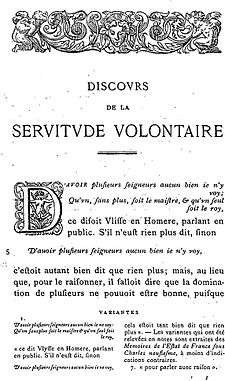Discourse on Voluntary Servitude
The Discourse on Voluntary Servitude. (French: Discours de la servitude volontaire) is a most famous work attributed to Étienne de La Boétie by Montaigne. The text was published clandestinely in 1577.
 | |
| Author | anonym |
|---|---|
| Original title | Discours de la servitude volontaire |
| Country | Kingdom of France |
| Language | Middle French |
| Genre | Essay |
Publication date | 1577 |
The date of preparation of the Discourse on Voluntary Servitude is uncertain: according to recent studies it was composed by Étienne de La Boétie during his university education. According to his closest friend Michel de Montaigne, the speech was written when La Boétie was about 18 years old.[1]
Content
The essay argues that any tyrant remains in power while his subjects grant him that, therefore delegitimizing every form of power. The original freedom of men would be indeed abandoned by society which, once corrupted by the habit, would have preferred the servitude of the courtier to the freedom of the free man, who refuses to be submissive and to obey.
This relation between domain and obedience would be resumed later by anarchist thinkers. Lew Rockwell summarizes La Boétie’s political philosophy as follows:
To him, the great mystery of politics was obedience to rulers. Why in the world do people agree to be looted and otherwise oppressed by government overlords? It is not just fear, Boetie explains in “The Discourse on Voluntary Servitude,” for our consent is required. And that consent can be non-violently withdrawn.[2]
Influence
The thought of La Boétie was also taken up by many movements of civil disobedience, which drew from the concept of rebellion to voluntary servitude the foundation of its instrument of struggle. Étienne de La Boétie was one of the first to theorize and propose the strategy of non-cooperation, and thus a form of nonviolent disobedience, as a really effective weapon.
1575 Nicholas Barnaud The morning awakening of the French "Reveille matin des Francais"......herditary right of kings tempered by advice from electors of the people. He thunders against voluntary servitude in which whole people s stagnated. A servitude which Etienne de la Boetie explained by three series of factors in "Discourse on voluntary servitude" (1574-6)
a) custom or acclimatisation
b) reverence for religious or sacred rites which sustain or tower over tyranny
C) proliferation of fear.
Bibliography
- Œuvres complètes, Editions William Blake & Co., 1991. ISBN 2-905810-60-2
- Discours de la servitude volontaire, Editions Mille et une nuits, 1997. ISBN 2-910233-94-4
- Discours de la servitude volontaire, Editions Flammarion, 1993. ISBN 2-08-070394-3
- The Politics of Obedience: The Discourse of Voluntary Servitude, translated by Harry Kurz and with an introduction by Murray Rothbard, Montrèal/New York/London: Black Rose Books, 1997. ISBN 1-55164-089-9
- The Politics of Obedience: The Discourse of Voluntary Servitude, translated by Harry Kurz and with an introduction by Murray Rothbard, Free Life Editions, 1975. ISBN 0-914156-11-X
References
- Murray Rothbard, Introduction to The Politics of Obedience: The Discourse of Voluntary Servitude by Étienne de la Boétie, translated by Harry Kurz, New York: Free Life Editions, 1975, note 4, republished by the Mises Institute 2002: "Having remained long in manuscript, the actual date of writing the Discourse of Voluntary Servitude remains a matter of dispute. It seems clear, however, and has been so accepted by recent authorities, that Montaigne's published story that La Boétie wrote the Discourse at the age of eighteen or even of sixteen was incorrect. Montaigne's statement, as we shall see further below, was probably part of his later campaign to guard his dead friend's reputation by dissociating him from the revolutionary Huguenots who were claiming La Boétie's pamphlet for their own. Extreme youth tended to cast the Discourse in the light of a work so youthful that the radical content was hardly to be taken seriously as the views of the author. Internal evidence as well as the erudition expressed in the work make it likely that the Discourse was written in 1552 or 1553, at the age of twenty-two, while La Boétie was at the university. See Bonnefon, op. cit., pp. xxxvi-xxvii;" The full text of the introduction by Myrray Rothbard and of The Discourse of Voluntary Servitude may be found here: https://mises.org/library/political-thought-%C3%A9tienne-de-la-bo%C3%A9tie
- Rockwell, Lew (11 February 2011), Étienne de la Boetie and Egypt, LewRockwell.com
Further reading
- Keohane, Nannerl O. (1977). ‘The Radical Humanism of Étienne de la Boétie’, Journal of the History of Ideas. 38:119–130.
- Lablénie, Edmond (1930). ‘L’Énigme de la “Servitude Volontaire”’, Revue du seizième siècle. 17:203–227 [French].
- Podoksik, Efraim (2003). ‘Estienne de La Boëtie and the Politics of Obedience’, Bibliothèque d’Humanisme et Renaissance. LXV(1): 83–95.
- Presley, Sharon (2008). "La Boétie, Étienne de (1530–1563)". In Hamowy, Ronald (ed.). The Encyclopedia of Libertarianism. Thousand Oaks, CA: SAGE; Cato Institute. p. 277. doi:10.4135/9781412965811.n165. ISBN 978-1-4129-6580-4. LCCN 2008009151. OCLC 750831024.
- Rothbard, Murray. 'Ending Tyranny Without Violence', originally titled The Political Thought of Étienne de La Boétie
External links
- Discourse on Voluntary Servitude from Wikisource